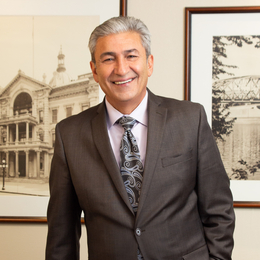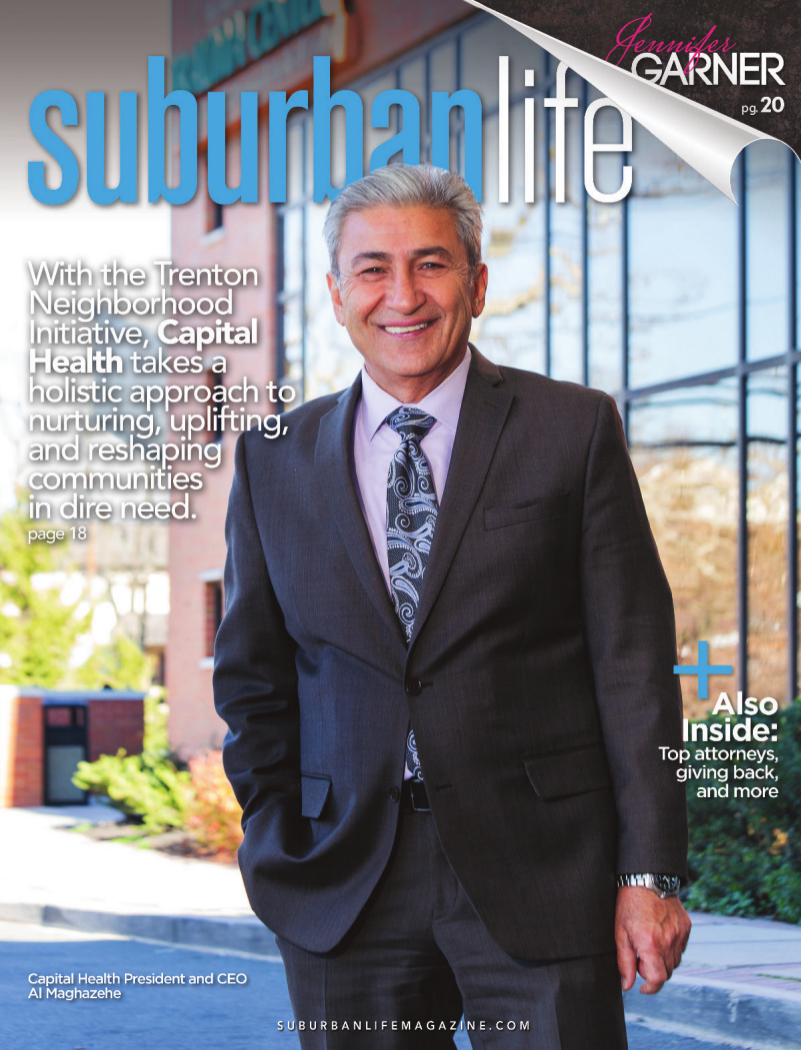
Hope and Healing
With the Trenton Neighborhood Initiative, Capital Health takes a holistic approach to nurturing, uplifting, and reshaping communities in dire need.
COVID-19 turned life upside down for every American. To Al Maghazehe, Ph.D., FACHE, the pandemic seemed to be particularly tough on the residents of Trenton, New Jersey.
Maghazehe, the long-serving president and CEO of Capital Health, recalls the first year of the pandemic as a difficult yet inspiring time, as the staff of Capital Health shined amid the overwhelming need for comprehensive care. At the same time, he noticed a troubling trend—namely, a significant uptick in the number of sharp force traumas, another term for stabbings, in the Trenton area.
“The pandemic reinforced many issues in our community,” he says. “The number one issue we saw was that people had no hope. They were not connected. Many didn’t have jobs. Some of them had no roof over their head, and they saw themselves as never being able to have a home. All of this together created a very serious issue—a neighborhood of people in crisis.”
During a Thursday morning meeting with his management team, Maghazehe issued a call to action: “We have to do something.” His plea led to the creation of the Trenton Neighborhood Initiative (TNI), a transformative multiyear plan Capital Health asked the Trenton Health Team to help implement.
Launched in 2021, the TNI takes a holistic, multipronged approach to improving the health of surrounding communities. The initiative’s goal: to increase opportunities, uplift community members, and reverse the hope deficit in neighborhoods near Capital Health Regional Medical Center, which has been safeguarding the health of Trenton residents since the late 1800s.
Capital Health provided $1 million in seed money to fund the TNI, a number that has multiplied through contributions from friends, neighbors, and a growing roster of corporate partners. So far, the list of corporate and private foundation partners includes Allied Universal, Bank of America, Bristol Myers Squibb Foundation, Investors Bank, Janssen/Johnson & Johnson, Labcorp Foundation, Citizens Bank Philanthropic Foundation, Ocean First Bank Foundation, the George H. Sands and Estelle M. Sands Foundation, Princeton Mercer Regional Chamber, Sodexo, PSE&G Foundation, and Wawa Foundation, among others.
Driven by a pledge to raise $10 million, the initiative’s first phase strives to enhance the ways in which Trentonians live, work, grow, and connect.
On the “live” front, the TNI aims to increase homeownership in Trenton, redevelop and revitalize neighborhoods, and create safe public spaces, thereby ensuring that residents have healthy places to call home. So far, the initiative has provided financial assistance and counseling to help people buy homes in Trenton, as well as fund necessary home improvements. It also outlines strategies to identify and eliminate lead and other home-health hazards, and convert vacant properties into ones that can be actively used.
In regard to the “work” leg of the stool, the TNI strives to expand access to the education and training needed to help Trentonians compete for better jobs, in part by creating employment pipelines for residents to work at Capital Health. One example is the EMT Academy, which is designed to train future emergency medical technicians (EMTs) and provide pathways to full-time employment. Those who participate in the training program are paid as employees of Capital Health and become certified EMTs, after which time they will graduate into full-time EMT positions with Capital Health.
“We’ve already graduated 25 or 26 people through this program,” Maghazehe says. “We’re paying these kids while they’re going to school, and once they’re certified, they’re working. They can also go on to Mercer County Community College and get their two-year associate’s degree, and from there they can go to Rider [University] for their bachelor’s degree, or even go on for their master’s, with the benefit of tuition discounts.”
On the “grow” side, the TNI offers an array of services to improve the health and well-being of future generations. The TNI Family Support Program connects North Trenton families with a community health worker to achieve housing and economic stability and improve health outcomes for children, their parents, and seniors. TNI Family Support assists families by purchasing emergency supplies (such as food, diapers, and car seats), filling out applications for benefits like insurance and food stamps, facilitating communication with health care and social service providers, and providing guidance for routine appointments, records, and prescriptions.
“Health care and food are key aspects of the program, because it’s hard to get ahead when you’re sick and hungry,” Maghazehe says. “To address hunger in Trenton, we partnered with [local nonprofit] Arm in Arm to have a mobile pantry come to different sites once a week, bringing in fresh produce, groceries, and other essentials. We have already served 3,000 families through this aspect of the program.”
Finally, on the “connect” side, Maghazehe says TNI is helping to “bridge the digital divide” by increasing access to computers and reliable internet connectivity, thereby unlocking opportunities in education, economic mobility, and communication. The initiative includes complementary reconditioned laptops and other devices for those who need them, as well as the coaching required to effectively use technology that may be unfamiliar to many.
“We constantly engage with elected officials, including [New Jersey Gov. Phil Murphy], and we send them updates often,” Maghazehe adds. “With everyone as involved as they have been, and with all the things we’re hoping to accomplish over the next three years, we’d like to see this become a national model to address the social determinants of health. We are the largest private employer in Trenton, so we have a huge responsibility to make sure the people who live in this community are healthy and able to live comfortably.”
The TNI aside, Capital Health has undergone a remarkable transformation since Maghazehe became chief executive in 1998. Twenty-five years later, he still loves the job.
“The most meaningful thing about this work is when people come here with serious problems and they’re able to walk out happy and healthy,” he says. “The other one is when babies are born. It’s the best, most valuable experience you can provide for any parent. My granddaughters were born here, and spending time with them is the most wonderful thing in the world.”
Maghazehe says Capital Health is better prepared than ever to serve members of the community. Of the many enhancements, improvements, and modes of expansion Capital Health has undertaken over the years, he cites a few in particular: the December 2022 acquisition of St. Francis Medical Center in East Trenton; investments in more than 6,000 employees, including its staff of exceptional physicians, nurses, and other members of the clinical team; and the emergence of Capital Health Cancer Center as a cancer center of excellence where patients seek treatment for all forms of the disease, including notoriously difficult cancers such as pancreatic cancer.
Maghazehe looks forward to Capital Health’s continued growth. As the health system evolves, he says its mission will remain largely unchanged: to enhance the overall well-being of residents of Central New Jersey, as well as those who live across the river in Lower Bucks County.
“My job is to look at Capital Health not just as a hospital where people come to be cared for,” he says. “We also have other responsibilities—to provide jobs, to support local vendors, and to support the community in every way possible—and we can never lose sight of that. I think everything we’re doing with the TNI shows that we’re paying attention to what’s really important to the communities we serve.”
For more information about Capital Health, including its medical centers in Pennington, Trenton, and Hamilton, New Jersey, visit www.capitalhealth.org. For more information about the Trenton Neighborhood Initiative, visit tnitrenton.org.
Photo by Alison Dunlap
Published (and copyrighted) in Suburban Life, December 2023



